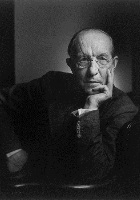The Forsaken Poem by Duncan Campbell Scott
The Forsaken
I
Once in the winter
Out on a lake
In the heart of the north-land,
Far from the Fort
And far from the hunters,
A Chippewa woman
With her sick baby,
Crouched in the last hours
Of a great storm.
Frozen and hungry,
She fished through the ice
With a line of the twisted
Bark of the cedar,
And a rabbit-bone hook
Polished and barbed;
Fished with the bare hook
All through the wild day,
Fished and caught nothing;
While the young chieftain
Tugged at her breasts,
Or slept in the lacings
Of the warm tikanagan.
All the lake-surface
Streamed with the hissing
Of millions of iceflakes
Hurled by the wind;
Behind her the round
Of a lonely island
Roared like a fire
With the voice of the storm
In the deeps of the cedars.
Valiant, unshaken,
She took of her own flesh,
Baited the fish-hook,
Drew in a gray-trout,
Drew in his fellows,
Heaped them beside her,
Dead in the snow.
Valiant, unshaken,
She faced the long distance,
Wolf-haunted and lonely,
Sure of her goal
And the life of her dear one:
Tramped for two days,
On the third in the morning,
Saw the strong bulk
Of the Fort by the river,
Saw the wood-smoke
Hand soft in the spruces,
Heard the keen yelp
Of the ravenous huskies
Fighting for whitefish:
Then she had rest.
II
Years and years after,
When she was old and withered,
When her son was an old man
And his children filled with vigour,
They came in their northern tour on the verge of winter,
To an island in a lonely lake.
There one night they camped, and on the morrow
Gathered their kettles and birch-bark
Their rabbit-skin robes and their mink-traps,
Launched their canoes and slunk away through the islands,
Left her alone forever,
Without a word of farewell,
Because she was old and useless,
Like a paddle broken and warped,
Or a pole that was splintered.
Then, without a sigh,
Valiant, unshaken,
She smoothed her dark locks under her kerchief,
Composed her shawl in state,
Then folded her hands ridged with sinews and corded with veins,
Folded them across her breasts spent with the nourishment of children,
Gazed at the sky past the tops of the cedars,
Saw two spangled nights arise out of the twilight,
Saw two days go by filled with the tranquil sunshine,
Saw, without pain, or dread, or even a moment of longing:
Then on the third great night there came thronging and thronging
Millions of snowflakes out of a windless cloud;
They covered her close with a beautiful crystal shroud,
Covered her deep and silent.
But in the frost of the dawn,
Up from the life below,
Rose a column of breath
Through a tiny cleft in the snow,
Fragile, delicately drawn,
Wavering with its own weakness,
In the wilderness a sign of the spirit,
Persisting still in the sight of the sun
Till day was done.
Then all light was gathered up by the hand of God and hid in His breast,
Then there was born a silence deeper than silence,
Then she had rest.
.......this brave lady was like the colourful leaves of autumn.....destined to fall to the ground....and ultimately we are all just a leaf waiting to fall from the tree of life.....truly a great poem.....and so sad they would leave her...
We have recently studied this poem for English at my school. I am doing an essay on it and the way it contrasts with 'Everybody's Mother' by Liz Lochhead in my external exam for NCEA Level 2 tomorrow. I really like this poem and have rated it 8/10. It shows the strength ('valient, unshaken') that the Chipewa woman possesed. It's so empowering to see how she doesn't protest her fate, she merely accepts her situation and understands it is the way things are. I admire her for the strength she shows.
This poem has not been translated into any other language yet.
I would like to translate this poem
Yum